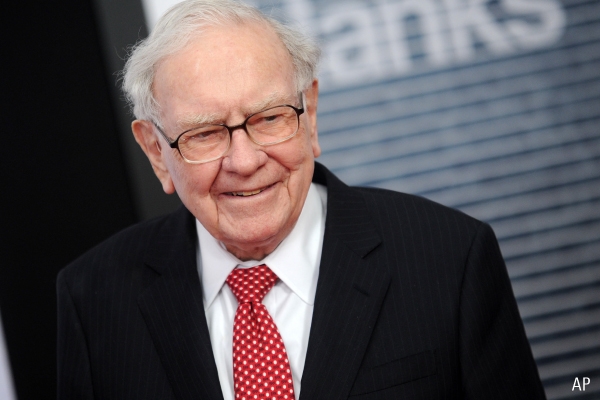3 Warren Buffett Stocks to Buy
These undervalued stocks are among Berkshire Hathaway’s holdings in 2023.

Berkshire Hathaway BRK.A BRK.B holds its annual meeting in Omaha this weekend. To celebrate, we at Morningstar are sharing lessons on money and more from Warren Buffett and Charlie Munger, explaining how to invest like Buffett, looking at funds that buy like Buffett—and of course, scouring Berkshire’s portfolio for undervalued Warren Buffett stock picks.
Many of the publicly traded stocks held in Berkshire Hathaway are fairly valued or overvalued today, according to Morningstar’s metrics.
3 Warren Buffett Stock Picks
These stocks were among Berkshire Hathaway’s holdings heading into 2023—and these stocks look undervalued at the start of May based on Morningstar’s metrics:
Here’s a little bit about why we like each of these stocks at these prices, along with some key metrics for each. All data is as of April 28, 2023.
RH
- Morningstar Rating: 4 stars
- Morningstar Economic Moat Rating: None
- Morningstar Capital Allocation Rating: Exemplary
- Industry: Specialty Retail
Berkshire Hathaway owned more than 10% of RH’s stock coming into 2023. The luxury retailer is forecasting a contraction in 2023 sales and operating profit, given rising interest rates and declining sales of existing $1 million-plus homes. We think RH stock is worth $327, and shares are trading at a 22% discount to that fair value today.
Here’s what Morningstar senior analyst Jaime M. Katz thinks of RH after earnings:
“RH has gained share in the fragmented $143 billion (U.S. Census) domestic furniture and home furnishing market in recent years, curating differentiated offerings from specialized global artisans. The firm has broadened its brand awareness by expanding into underserved categories including modern, teen, and hospitality, where few peers nationally compete, leading to incremental market share gains from boutique competitors. Brand equity should remain stable given the pace of tailored store buildouts, category expansions, and pricing consistency, but the diverse end-market expansions RH is pursuing could make it tough to capture a cost advantage. Entry into $200 billion hotel industry and $1.7 trillion domestic housing market should help support high-single-digit top line growth over the longer term.
Although we rate RH no-moat, we believe the brand has built awareness across a selective consumer demographic, thanks to its luxury positioning. However, given the intense competitive landscape that can often be pervasive across home furnishing, we have refrained from assigning RH a moat.
We are adjusting our fair value estimate to $327 from $375 per share after incorporating an updated 2023 outlook that considers a much weaker luxury housing market. Given rising interest rates over the past year and dire existing home sales of units over $1 million (which have averaged 38% declines over the last three months, according to the National Association of Realtors), correlated spending on home furnishings is slowing. That said, we don’t think demand has permanently evaporated or been reallocated to lower-price offerings; rather, we think such spending has been postponed until equity markets (where significant household wealth is held) and interest rates (for mortgage costs) stabilize.”
General Motors
- Morningstar Rating: 5 stars
- Morningstar Economic Moat Rating: None
- Morningstar Capital Allocation Rating: Standard
- Industry: Auto Manufacturers
The market keeps underestimating this longtime Warren Buffett stock pick. GM continues to enjoy robust pricing power and recently raised its full-year guidance for 2023. Morningstar thinks that U.S. autos have been at recessionary levels since 2020, so if the U.S. enters a recession, we would expect continued rising industry volumes. We assign GM stock a $78 fair value estimate, and shares are trading 58% below that.
Here’s what Morningstar strategist David Whiston thinks of GM today:
“We see General Motors with a competitive lineup in all segments it competes in, combined with a reduced cost base, finally enabling it to have the scale to match its size. We think GM’s earnings potential is excellent because the company has a healthy North American unit and a nearly mature finance arm with GM Financial. Moving hourly workers’ retiree healthcare to a separate fund and closing plants drastically lowered GM North America’s breakeven point to U.S. industry sales of about 10 million-11 million vehicles, assuming 18%-19% share. We expect more scale to come from GM moving its production onto vehicle sets over the next few years and a joint venture making EV batteries for even more flexibility and scale.
GM makes products that consumers are willing to pay more for than in the past. It no longer has to overproduce trying to cover high labor costs and then dump cars into rental fleets (which hurts residual values). GM now operates in a demand-pull model where it can produce only to meet demand and is structured to do no worse than break even at the bottom of an economic cycle when plants can be open. The result is higher profits than under old GM despite lower U.S. share. It now seeks roughly $300 billion in total revenue by 2030 with about $80 billion from many new high-margin businesses such as insurance, subscriptions, and selling data, while targeting 2030 total company adjusted EBIT margin of 12%-14%, up from 9.2% in 2022, 11.3% in 2021, and 7.9% in 2020.
We think actions such as buying Cruise, along with GM’s connectivity and data-gathering via OnStar, position GM well for this new era. Cruise is offering autonomous ride-hailing with its Origin vehicle, and GM targets $50 billion of Cruise revenue in 2030 after just $1 billion targeted in 2025. GM is investing over $35 billion in battery electric and autonomous vehicles for 2020-25 and is launching 30 BEVs through 2025 with two thirds of them available in North America. Management also targets over 2 million annual BEV sales by mid-decade and in early 2021 announced the ambition to only sell zero-emission vehicles globally by 2035.”
Citigroup
- Morningstar Rating: 5 stars
- Morningstar Economic Moat Rating: None
- Morningstar Capital Allocation Rating: Standard
- Industry: Banks—Diversified
This Warren Buffett stock pick was initially purchased during the first quarter of 2022. Morningstar thinks Citigroup is a work in progress: The bank is in the midst of refocusing on its core international corporate banking unit and its North American consumer and global wealth businesses. The bank’s complex story has weighed on its stock price: We think Citigroup stock is worth $75, and it’s trading in 5-star range as of this writing, suggesting that it’s significantly undervalued. In fact, Citi stock is among our analysts’ top 33 undervalued stocks for second-quarter 2023.
Here’s what Morningstar strategist Eric Compton has to say about Citi after earnings:
“No-moat-rated Citigroup was our top pick at the start of 2022 and remains one of the more undervalued banks under our coverage in 2023. First-quarter results supported our multistep thesis for the name as the overall revenue and expense outlooks remained unchanged, the bank sold off additional business units, and first-quarter results were even better than we expected.
Going into the quarter, we felt that the largest banks would be fine. While profitability would face some pressure in the short term, in the longer term it would not be destroyed. With no major disappointments, and with the bank seeming to handle the current turmoil just fine, we do not plan on making a material change to our fair value estimate of $75.
We continue to view Citigroup as an undervalued stock with idiosyncratic catalysts that could help unlock value over the next several years.
First-quarter adjusted earnings per share of $1.86 came in ahead of the FactSet consensus of $1.65 and just ahead of our own estimate of $1.76. The primary difference with our own estimate was a 4% beat on net interest income, or NII, and a 4% beat on expenses.
Citigroup’s earnings are set to be quite messy for a while, and we think it is more important to ignore the noise and focus on core operations and the bank’s key targets. Here, the bank’s core (ex-legacy) operations showed slight growth in NII, solid overall performance within the ICG services group, and expenses that are just beginning to approach run rates that we hope the bank can hold the line on. We think the bank will need a turnaround in several of its key fee categories to meet medium-term revenue growth targets, and we also have some worries about how ICG services revenue will respond if rates are eventually cut, but otherwise most other targets seem on track for now.”
More About Warren Buffett Stock Picks
Warren Buffett has said that he doesn’t consider himself to be a stock-picker; instead, he’s a company-picker. That comment pretty much encapsulates how he thinks about stocks: They’re parts of businesses. Learn more about how the Oracle of Omaha chooses companies to buy in “How to Invest Like Warren Buffett.” And read about his influence on how Morningstar evaluates companies and rates stocks in “What We’ve Learned From Warren Buffett and Charlie Munger.”
The author or authors do not own shares in any securities mentioned in this article. Find out about Morningstar’s editorial policies.


:quality(80)/cloudfront-us-east-1.images.arcpublishing.com/morningstar/MG6XOCYGF5BO7MG5YRNBISB3SA.png)
:quality(80)/cloudfront-us-east-1.images.arcpublishing.com/morningstar/TXAOQ3NTDNAVLGMP3O4BVUVFTA.png)
:quality(80)/cloudfront-us-east-1.images.arcpublishing.com/morningstar/RH6K4NMACRHO3DQIPX57HVLLAU.png)